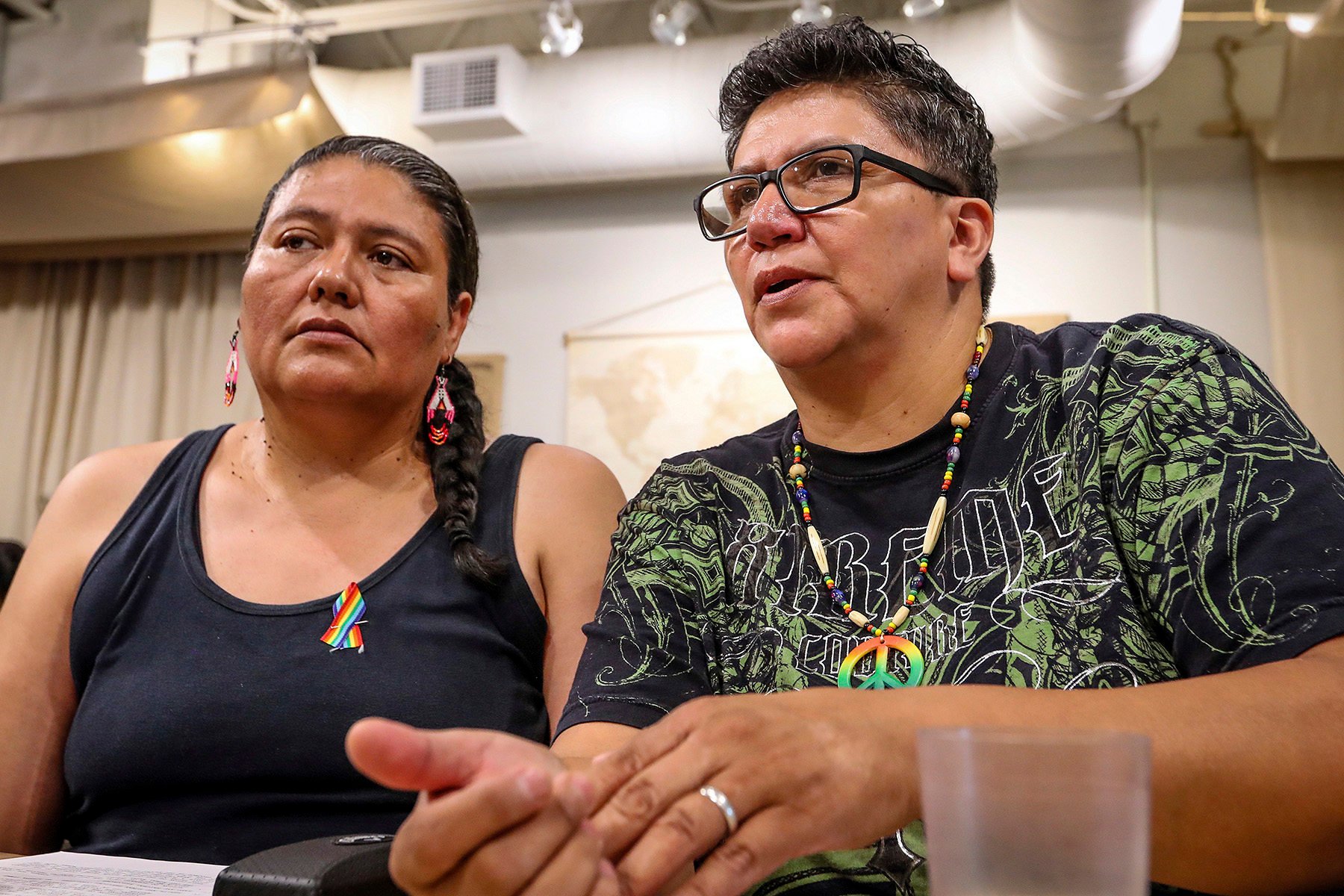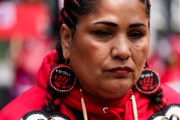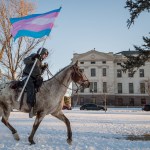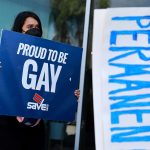On January 20, the day that President Trump again took the oath of office, Monique “Muffie” Mousseau got a slew of emails and phone calls.
“Homophobic people were saying the most horrific things,” she recalled. Two men threatened to kill her, and a woman said she wouldn’t exist any longer: “That I’m a virus to the United States.”
Mousseau is the executive director of Uniting Resilience, a grassroots organization based in Rapids City, South Dakota, that has advocated for LGBTQ+ Native youth since 2019. Following the inauguration, Mousseau and her wife, Felipa De Leon, made the difficult decision to stop posting about their organization’s events and resources on social media. They have become more guarded about their physical space, which has started to house other LGBTQ+ organizations that have been displaced by threats of violence and loss of funding in the new administration. Safety, lately, means keeping a lower profile.
“But we want the public to understand … we do exist and we are helping,” said Mousseau, a member of Oglala Lakota Sioux Tribe.
The stakes for Mousseau’s community could not be higher. Queer Indigenous youth — often referred to under the umbrella term of “two-spirit,” which recognizes sexual and gender diversity across many Native tribes — face some of the highest rates of discrimination, harassment, violence and suicide of any group in the LGBTQ+ community.
That is especially true in South Dakota. Native Americans represent over 8 percent of the population, making it the third largest Native population by percentage of any state. In 2022, the LGBTQ+ youth nonprofit The Trevor Project found in a survey that 53 percent of queer youth in South Dakota had seriously contemplated suicide, well above the national average of 37 percent.
For years, South Dakota has been the launchpad for anti-LGBTQ+ legislation. As Mousseau and De Leon watch the Trump administration chip away at LGBTQ+ rights nationally, they worry about the consequences at home.
A report released last month by the Human Rights Campaign andUniting Resilience details the extreme challenges facing South Dakota’s two-spirit youth in everything from schools to housing to law enforcement. The two-year snapshot found that many students who reported facing bullying in school over their gender identity were removed from their classes and forced to learn remotely.
-
Read Next:
Challenges faced by South Dakota’s Native people are numerous. According to the report, Native South Dakotans are 2.5 times more likely to experience violent crimes and twice as likely be sexually assaulted or raped. The overwhelming majority (93 percent) of the state’s hate crimes were related to a person’s race, ethnicity or LGBTQ+ identity, the report noted.
Ami Patel, senior litigation counsel at the Human Rights Campaign, said the recent report on South Dakota’s two-spirit youth exposed deep disparities facing kids that its organization would not have captured without a collaboration with Uniting Resilience.
“Our hope is to continue to engage with Uniting Resilience on the ground in South Dakota, to continue this work over many more years to come, and also continue to raise awareness,” Patel said.
Increasingly, LGBTQ+ youth, both Indigenous and White, have been seeking out the group for support as the climate in Rapids City grows hostile toward them. The kids have pleaded for help getting support at school. Uniting Resilience knew that tribal histories could offer an example to the youth, an untapped narrative in which they were reflected. Uniting Resilience has helped connect kids and their parents to that history throughout the state, two-spirit youth, allies and even adversaries.
In 2015, the Supreme Court declared that LGBTQ+ couples could marry in every state. But the ruling had no jurisdiction over tribal traditions. As a consequence, De Leon, Mousseau and many other queer indigenous couples went years without being recognized as married in their own communities.
Mousseau and De Leon reviewed the cultural teachings of their tribe to gain clarity on the roles of LGBTQ+ people historically. There were many examples of people assigned male who dressed as women, took care of the chickens and cooked the food. There were female-assigned people who loaded up the horses and prepared the sweat lodge for ceremonies, tasks typically assigned to men.
“And nobody is making fun of them, nobody’s saying anything, just calling them by their name and doing what has to be done,” Mousseau said.

In May 2019, De Leon and Mousseau began to push the Oglala Lakota Sioux tribe to recognize marriages like theirs. On July 8 of that year, the tribe passed an ordinance that did just that. That September, the tribe became the first to pass trans-inclusive hate crime protections, punishable by jail time, fines or restitution.
The following winter, South Dakota found itself in the middle of a national debate about health care for transgender minors. But as national press descended upon the capitol, lawmakers were greeted by the sight of two horseback riders with a transgender pride flag. The Oglala Lakota Sioux Tribe and others from across the state had shown up en masse to oppose the bill. The bill failed in committee, but perhaps more importantly, the state’s Indigenous leaders had sent a message to lawmakers.
“Homophobia isn’t traditional,” said Mousseau in the HRC report. “That’s a colonized way of thinking.”
The group holds biweekly sweat lodges, weekly youth groups and meetings. Over the past two years, they have hosted more than 500 people at their annual pow-wow. As anti-trans advocates argue that transgender identity is new, Uniting Resilience teaches its youth that they are connected to a long line of other gender diverse people and deeply woven into the state’s history.
“I just want you to know I’m the richest person in this continent because I know our home and our ways and our ceremonies,” Mousseau said. “I don’t judge anybody, and I don’t consider anybody a gender.”
De Leon and Mousseau speak about their work in terms of “flashing lights.” They liken everything they do for LGBTQ+ youth to a crisis response, and they are first responders.
De Leon recalls that in 2016, she learned her own niece had died by suicide. Her niece had been holding hands with another girl, which her teachers said she couldn’t do. De Leon hadn’t even known her niece was LGBTQ+ because family members didn’t tell her. The fact that teachers and family could talk to her niece in such a way still haunts her.
“[Her uncle was] saying we already have a carpet muncher in the family,” De Leon said. “We don’t need another one.”
The realities facing two-spirit youth in South Dakota are only getting harder, said Mousseau. Within two days of Trump’s inauguration, three other LGBTQ+ organizations in the state called Uniting Resilience, asking for office space. They had been ejected from their own. Uniting Resilience made room, even for groups that didn’t represent Native LGBTQ+ people.

Support The 19th
Your donation will allow us to maintain our independence and remain true to our mission to represent women and LGBTQ+ people. Together, we’ll continue to cover this ongoing American story — without fear or favor.
But in late April, the group made the excruciating decision to close their office altogether. Mousseau references threats of violence to the organization, murders near the office and displays of white supremacist symbols in town.
“I don’t want any of our LGBTQ+ groups to even experience any kind of violence … and the board knows that too,” she said. “It makes my stomach turn just talking with you about it, but it’s real, and I want you to know that, from my mouth, reality sucks right now with this administration. It’s very bad for somebody like me and my wife, 20 years together, having to navigate if we should hold hands or not.”
Uniting Resilience will continue to meet and hold youth groups, but won’t advertise those meetings widely. They have yet to decide if it’s safe to hold their annual pow-wow.
But Mousseau and De Leon say they are not discouraged. They’re working to educate law enforcement on issues facing two-spirit youth. They’re dreaming big — hoping someone can connect them with Lady Gaga or Taylor Swift.
“I just want you to know that we’re very active in not just our community, not just our state, but nationally,” Mousseau said. “You know, if a millionaire needs to donate money, send ‘em our way.”






